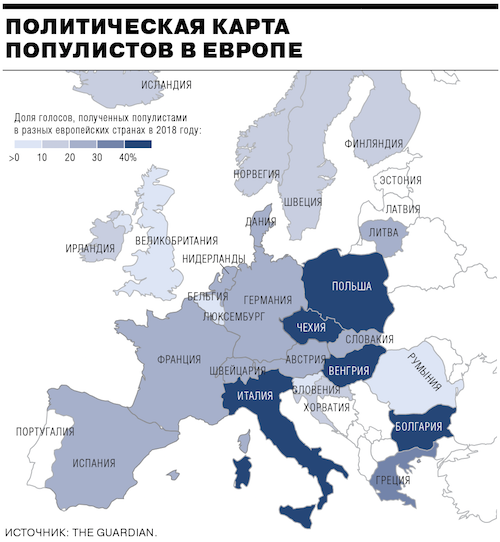Populism as a policy is becoming progressively popular all around the globe. And Kazakhstan is no exception. Note that, lately, the populist tactics has become the choice of both President Nursultan Nazarbayev and his key opponent Mukhtar Ablyazov.
The only difference between them lies in the fact that the President must back up his words with real actions whereas his adversary may indulge in promising anything he wants. This development is clearly not a coincidence. It is the result of the systemic world crisis.
From this perspective, we would like to draw our reader’s attention to an article published in Russian newspaper Kommersant. It is titled “Populism seizes a quarter of Europe. The Guardian studies how and why this happened”.
Here are several noteworthy quotes.
“In 1998, European populist parties had just 7% of votes across the continent. Now, one in four voters is prepared to cast a vote in their favor”.
“More than 30 political scientists and sociologists under the direction of leading expert of the University of Amsterdam Matthijs Roodujn have participated in the New Populism project. The scientists name all European parties that can be considered populist (their analysis includes all the EU states as well as Switzerland, Norway and Iceland during the period from 1998 to 2018).
The latest research show that more and more Europeans believe that they, the simple and honest citizens, are being deceived or used by the corrupt elites. This is the first step towards supporting the populists who promise to quickly redeem the situation.
There is a number of factors that play into the voters’ supporting populist parties.
+the society of today is more individualized; the voters are more independent in forming their opinion;
+all kinds of crises that occur on a regular basis – from political to financial ones; and the mainstream parties are usually to blame for bringing the country to this unfortunate state.
+the populists do not miss out on the chance to draw the voters’ attention to corrupt practices in the leading parties or emphasize the faultiness of choosing austerity policy during a crisis that wreaks havoc on the simple folks”.

Professor in international affairs at the University of Georgia Cas Mudde believes that there are three main reasons for the sharp rise of populism in Europe:
1) the great recession, which created a few strong left populist parties in the south;
2) the so-called refugee crisis, which was a catalyst for right populists;
3) the transformation of non-populist parties into populist parties (for example, Fidesz and Law and Justice (in Poland).
So, if, in 1998, the populists were included in the governments of only two European states – Switzerland and Slovakia; today, we must also add Norway, Finland, Poland, Czech Republic, Hungary, Austria, Italy, Bulgaria and Greece to the list. However, the scientists believe that this is not the limit. The elections scheduled for the first half of 2019 will probably demonstrate the further strengthening of populism. The researchers are speaking of Ukraine, Finland, Belgium and Denmark”.
Therefore, it is not surprising that Nazarbayev and Ablyazov are using the same tactics as their “colleagues” around the world. And they probably do so not so much on their own accord as by force of necessity. Of course, they themselves probably do not realize that. Especially Nursultan Nazarbayev who, over the course of his leadership of the authoritarian political system and the super-Presidential vertical, has become so accustomed to being “showered with caresses” by the propaganda and sycophants that, apparently, has come to believe in his own unique and singular nature.
The historical irony lies in the fact that all of this is happening one hundred years from the time when the same kind of systemic world crisis had led to the World War I that ended with the collapse of the Russian, Prussian, Austrian and Turkish empires, by the serious weakening of Great Britain, France and Italy and by the US establishing itself as the world’s leader. This crisis then continued as the adversary of the two political systems – the capitalist one and the socialist one within the framework of which World War II was replaced with the Cold War.
However, the use of populism in Kazakhstan may turn out to be quite dangerous for the existing political system and for Nazarbayev personally. Note that it is not just Mukhtar Ablyazov and the persuasiveness of his promises to immediately change things for the better after ascending to power, it is also the fact that, given the absence of intra-political competition and the mechanism of moving the power from one political force (party) to another (in other words, the absence of democracy as such), Akorda and Nazarbayev have become hostages of their own selves.
And it is clear why it is so. Amid the growth of the protest moods caused by a number of reasons both internal and external, objective and subjective, the Kazakh authorities, unlike other governments, will be unable to win over their citizens. Because the mechanism used in the democratic countries to search for new effective development strategies and for channeling the protest moods into a constructive direction is blocked in Kazakhstan.
For this reason, Nazarbayev had to transform himself from a strong state believer into a populist. And we can even name the exact date when this happened – October 5, 2018, when he released his address to the nation notedly titled “Welfare Growth of the Kazakhs: The Rise of the Incomes and the Quality of Life”.
We predict that Akorda’s efforts on increasing the level and quality of life, even if relatively successful (of which we have serious doubts), will not lessen the protest moods in the country and will not result in the growing support of the Kazakhs. We believe this will be so for these three reasons.
- Due to the passivity (the political, social, business and so forth) of most Kazakhs inherited from the Soviet times and actively supported by the authorities for the past 20 years.
- Due to the prevalence of the dependency mentality within the framework of the family as well as the state and society.
- Due to Akorda’s inability to increase the quality of life to at least the level of ten years ago let alone to the level of life in the developed states.
As a result, in Kazakhstan, populism may deliver a completely different result than it does in the USA, UK, Italy, Spain, etc. In these countries, the populists either ascend to power and, then, are forced to maintain a more balanced policy or get rejected by the voters. But all of this happens without changing the political system and the rules of the game.
In Kazakhstan, with its unchangeable political system and the power structure, populism will inflict a gigantic damage not so much on the state as on the people that have appropriated it, in other words, the Kazakh elite. And the latter, regardless of who the leader is – Nazarbayev or his successor – will find itself faced with the choice – to agree to it or to try and change the situation.
As for the mechanism of such change, it is well-known and has been used throughout history time and again. We are talking about transforming the authoritarian regime into the totalitarian one.
By the way, this mechanism was used in the USSR when the post-revolutionary populism of Vladimir Lenin and the Bolsheviks (the policy that helped them to, first, seize and, then, keep the political power) was transformed by Stalin into its complete antithesis.




